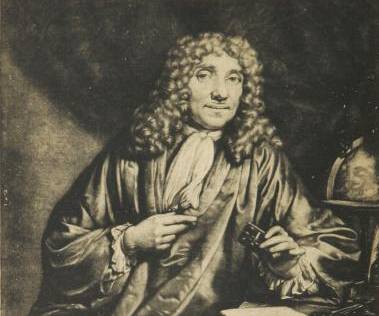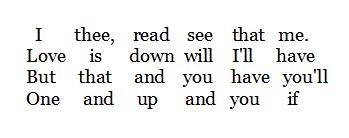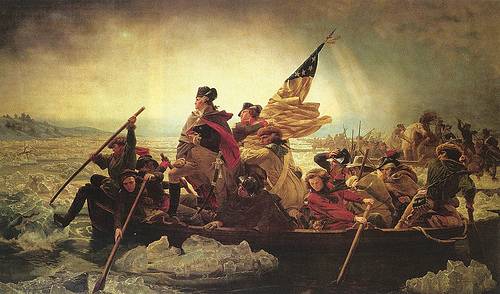
Higgamus hoggamus
“Anton Von Leewenhoek
Has a small problem,” con-
Fided his wife.
“Microbiology
Doesn’t disturb me; his
Microanatomy’s
Blighting my life!”
— Theodore L. Drachman

Higgamus hoggamus
“Anton Von Leewenhoek
Has a small problem,” con-
Fided his wife.
“Microbiology
Doesn’t disturb me; his
Microanatomy’s
Blighting my life!”
— Theodore L. Drachman

It was an evening in November,
As I very well remember,
I was strolling down the street in drunken pride,
But my knees were all a-flutter,
And I landed in the gutter
And a pig came up and lay down by my side.
Yes, I lay there in the gutter
Thinking thoughts I could not utter,
When a colleen passing by did softly say
“You can tell a man who boozes
By the company he chooses” —
And the pig got up and slowly walked away.
— Anonymous
U 0 a 0 but I 0 U,
O 0 no 0 but O 0 me;
O let not my 0 a 0 go,
But give 0 0 I 0 U so.
You sigh for a cipher but I sigh for you,
O sigh for no cipher, but O sigh for me;
O let not my sigh for a cipher go,
But give sigh for sigh, for I sigh for you so.
— Bizarre Notes and Queries, 1891

Here’s Wordsworth’s “Upon Westminster Bridge”:
Earth has not anything to show more fair:
Dull would he be of soul who could pass by
A sight so touching in its majesty:
This City now doth like a garment wear
The beauty of the morning; silent, bare,
Ships, towers, domes, theatres, and temples lie
Open unto the fields, and to the sky;
All bright and glittering in the smokeless air.
Never did sun more beautifully steep
In his first splendour valley, rock, or hill;
Ne’er saw I, never felt, a calm so deep!
The river glideth at his own sweet will:
Dear God! the very houses seem asleep;
And all that mighty heart is lying still!
Why start over? Wayne Carlson rearranged the words to make a new poem:
A city is lying still, asleep in the dull morning;
A steep hill towers more unto the smokeless sky,
Touching the heart and soul of God.
Bare fields doth lie in the valley,
Like ships that glideth, all silent in the river.
I saw all His own houses, now temples to the sun;
Sight at first has never felt more dear.
Who would not wear His gament, open to the calm air?
Could anything be so beautifully bright and glittering?
He will never show its theatres and domes;
Or pass by this fair Earth; a mighty rock,
Of very deep beauty, splendour, and majesty
Ne’er did seem so sweet!

— Bizarre Notes and Queries, 1891

What’s odd about this sonnet, composed in 1936 by David Shulman?
A hard, howling, tossing water scene.
Strong tide was washing hero clean.
“How cold!” Weather stings as in anger.
O Silent night shows war ace danger!
The cold waters swashing on in rage.
Redcoats warn slow his hint engage.
When star general’s action wish’d “Go!”
He saw his ragged continentals row.
Ah, he stands – sailor crew went going.
And so this general watches rowing.
He hastens – winter again grows cold.
A wet crew gain Hessian stronghold.
George can’t lose war with’s hand in;
He’s astern – so go alight, crew, and win!
Each line is an anagram of WASHINGTON CROSSING THE DELAWARE.
There was a young lady named Psyche
Who was heard to ejaculate, “Pcryche!”
For, riding her pbych,
She ran over a ptych,
And fell on some rails that were pspyche.
As a farmer was going to plough,
He met a man driving a cough;
They had words which led to a rough,
And the farmer was struck on his brough.
One day when the weather was rough,
An old lady went for some snough,
Which she thoughtlessly placed in her mough,
And it got scattered, all over her cough.
While a baker was kneading his dough,
A weight fell down on his tough,
When he suddenly exclaimed ough!
Because it had hurt him sough.
There was a hole in the hedge to get through,
It was made by no one knew whough;
In getting through a boy lost his shough,
And was quite at a loss what to dough.
A poor old man had a bad cough,
To a doctor he straight went ough,
The doctor did nothing but scough,
And said it was all fancy, his cough.
— Anonymous, cited in Carolyn Wells, A Whimsey Anthology, 1906
A univocalic is a poem that uses only one vowel. This example was composed by Charles Bombaugh in 1875:
Incontrovertible Facts
No monk too good to rob, or cog or plot.
No fool so gross to bolt Scotch collops hot.
From Donjon tops no Oronooko rolls.
Logwood, not lotos, floods Oporto’s bowls.
Troops of old tosspots oft to sot consort.
Box tops odd schoolboys oft do flog for sport.
No cool monsoons blow soft on Oxford dons,
Orthodox, jog-trot, book-worm Solomons!
Bold Ostrogoths of ghosts no horror show.
On London shop-fronts no hop-blossoms grow.
To crocks of gold no dodo looks for food.
On soft cloth footstools no old fox doth brood.
Long storm-tost sloops forlorn work on to port.
Rooks do not roost on spoons, nor woodcocks snort,
Nor dog on snowdrop or on coltsfoot rolls,
Nor common frog concocts long protocols.
Let others talk of L N’s eyes,
And K T’s figure light and free,
Say L R, too, is beautiful —
I heed them not while U I C.
U need not N V them, for U
X L them all, my M L E.
I have no words when I would tell
How much in love with U I B.
So sweet U R, my D R E,
I love your very F E G;
And when you speak or sign, your voice
Is like a winsome L O D.
When U R I C, hope D K’s,
I am a mere non- N T T.
Such F E K C has your smile,
It shields from N E N M E.
For love so deep as mine, I fear,
There is no other M E D.
But that you love me back again —
O, thought of heavenly X T C;
So, lest my M T heart and I
Should sing for love an L E G,
T’s me no more — B Y’s, B kind,
O, M L E, U R, I C!
— Anonymous, cited in Carolyn Wells, A Whimsey Anthology, 1906